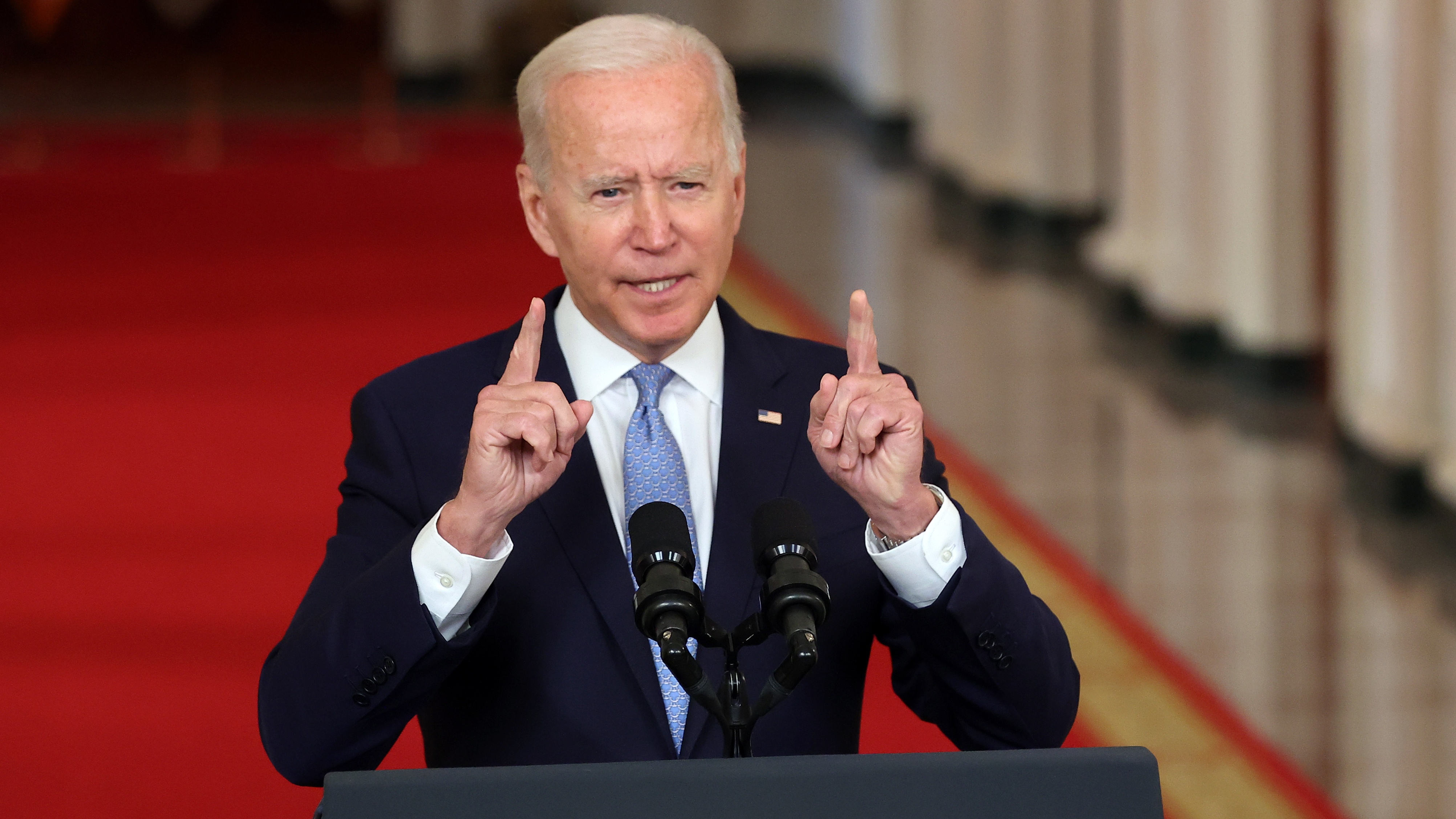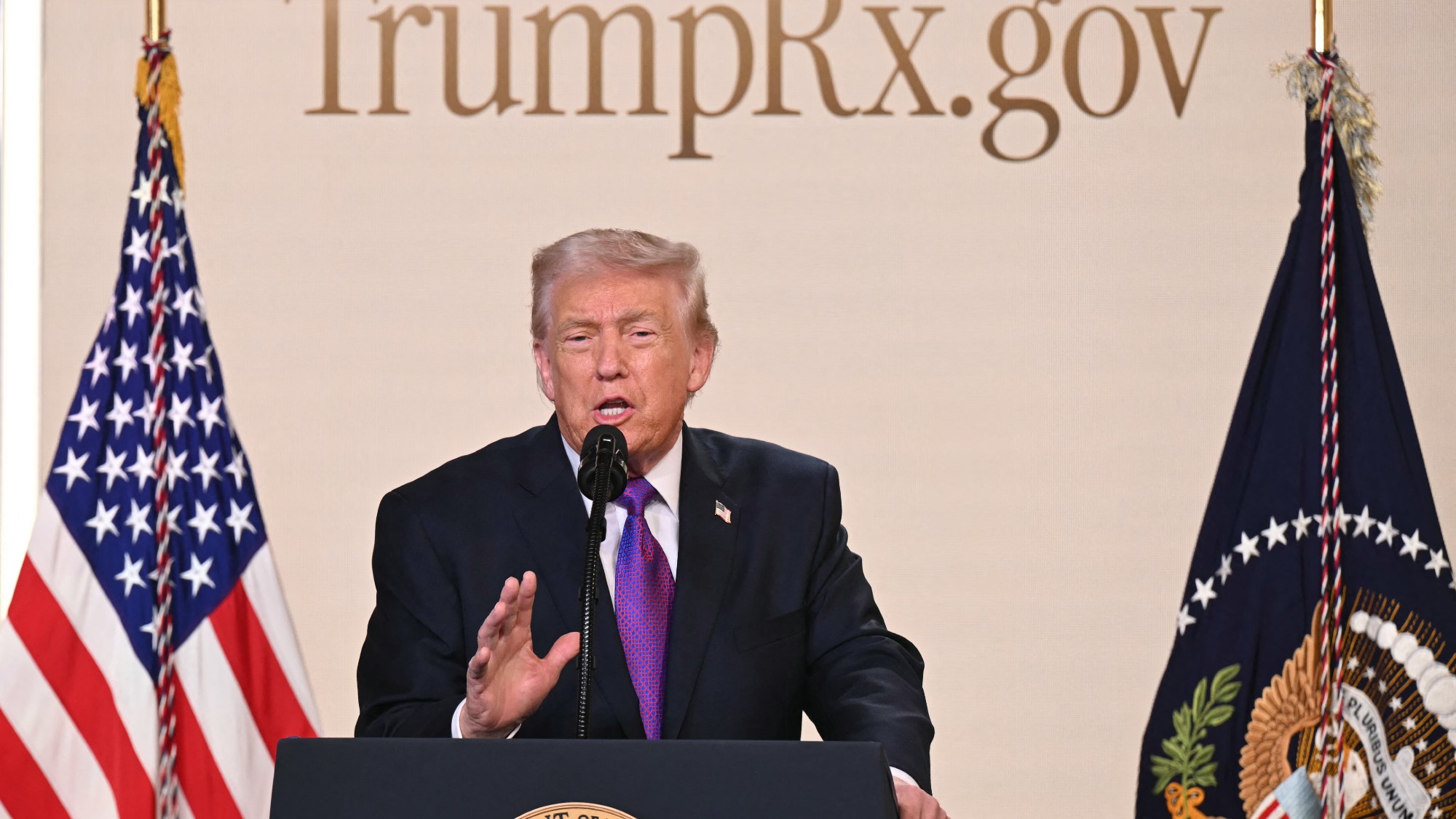Will the Afghanistan withdrawal hurt Joe Biden in the US midterms?
President’s approval ratings have plummeted since the deadly evacuation

A free daily email with the biggest news stories of the day – and the best features from TheWeek.com
You are now subscribed
Your newsletter sign-up was successful
Joe Biden’s approval ratings have plummeted since the Taliban swept into Kabul two weeks ago, with Democrats fearing the chaotic withdrawal could cost them control of Congress in next November’s midterm elections.
The US president has “put the bravest face possible on the bloody and chaotic US withdrawal from Afghanistan”, the Financial Times said, “defending his move to end a 20-year conflict that dogged three of his predecessors as an act of political courage”.
“I believe this is the right decision, a wise decision, and the best decision for America,” Biden yesterday said at the end of his White House speech on the final day of the pullout.
The Week
Escape your echo chamber. Get the facts behind the news, plus analysis from multiple perspectives.

Sign up for The Week's Free Newsletters
From our morning news briefing to a weekly Good News Newsletter, get the best of The Week delivered directly to your inbox.
From our morning news briefing to a weekly Good News Newsletter, get the best of The Week delivered directly to your inbox.
The withdrawal from Afghanistan “has been a pillar of Biden’s foreign policy vision for years, and until recently it did not seem to carry much political peril”, continued the FT, noting that it was widely backed by “war-weary” US voters.
‘Indelible stain?’
As the world’s eyes turned to the chaotic scenes at Kabul airport and a deadly terrorist attack carried out by Isis-K, his approval rating fell to its lowest point of his presidency so far this week, at less than 50%, according to a Morning Consult poll.
But “there are two ways this could go”, according to Time. “The withdrawal could become an indelible stain on Biden’s legacy, and remain the most pressing issue for voters in the midterm elections next year,” the magazine said.
A free daily email with the biggest news stories of the day – and the best features from TheWeek.com
“Or it could fade from voters’ minds in the coming months and years as they focus more on the Covid-19 pandemic and economic issues.”
While most pollsters say it is too early to tell how much of a mark the debacle might leave on the Biden administration, it is clear he has reached “the most difficult moment of his presidency so far”.
GOP attack
Whether it sticks in the minds of voters or not, the circumstances surrounding the withdrawal are a gift to Republicans, who now “smell blood having until now struggled to find an effective line of attack against Biden as candidate or president”, reported The Guardian.
Although foreign policy “rarely decides” US elections, the criticisms levelled at the president throughout the withdrawal have “fuelled a pre-existing narrative that the 78-year-old does not have ‘the right stuff’”, the paper added.
Some Republicans have called for Biden’s resignation, while Trump loyalists have gone so far as to call for impeachment. But “Biden isn’t going anywhere”, said The Hill, noting that there is “zero chance” that House Democrats would move to impeach the president.
However, “in calling for impeachment and resignation, Republicans are trying to demonstrate to their base how they would provide a check on the Biden presidency if voters hand them the House and Senate in the 2022 midterm elections”, suggested the news site.
As many senior Republicans see it, the “botched” withdrawal could be the event that “will propel the GOP back into power on Capitol Hill”. Biden commands a narrow majority in Congress, and Republicans only need to flip a net of five seats to win back the House and just one to take the Senate.
Difficult though it may have been, the US withdrawal from Afghanistan is “probably not” going to “derail President Biden’s entire agenda”, said political commentator Matt Bai in The Washington Post.
It is clear that “Democratic Washington is in the grip of panic” as the fallout continues, he added, but “all presidents get pounded by unforeseen crises” and “midterm elections are pretty much never driven by foreign policy”.
“Will voters a year from now focus on the economy? Yes. The state of the pandemic? Sure. Government spending? Entirely possible,” he said. “Bungling the end of a 20-year war in Afghanistan – a withdrawal that most people supported? Very, very unlikely.”
Sorcha Bradley is a writer at The Week and a regular on “The Week Unwrapped” podcast. She worked at The Week magazine for a year and a half before taking up her current role with the digital team, where she mostly covers UK current affairs and politics. Before joining The Week, Sorcha worked at slow-news start-up Tortoise Media. She has also written for Sky News, The Sunday Times, the London Evening Standard and Grazia magazine, among other publications. She has a master’s in newspaper journalism from City, University of London, where she specialised in political journalism.
-
 Democrats seek calm and counterprogramming ahead of SOTU
Democrats seek calm and counterprogramming ahead of SOTUIN THE SPOTLIGHT How does the party out of power plan to mark the president’s first State of the Union speech of his second term? It’s still figuring that out.
-
 Climate change is creating more dangerous avalanches
Climate change is creating more dangerous avalanchesThe Explainer Several major ones have recently occurred
-
 What’s TrumpRx and who is it for?
What’s TrumpRx and who is it for?The Explainer The new drug-pricing site is designed to help uninsured Americans
-
 Democrats seek calm and counterprogramming ahead of SOTU
Democrats seek calm and counterprogramming ahead of SOTUIN THE SPOTLIGHT How does the party out of power plan to mark the president’s first State of the Union speech of his second term? It’s still figuring that out.
-
 Why are election experts taking Trump’s midterm threats seriously?
Why are election experts taking Trump’s midterm threats seriously?IN THE SPOTLIGHT As the president muses about polling place deployments and a centralized electoral system aimed at one-party control, lawmakers are taking this administration at its word
-
 ‘The forces he united still shape the Democratic Party’
‘The forces he united still shape the Democratic Party’Instant Opinion Opinion, comment and editorials of the day
-
 How are Democrats turning DOJ lemons into partisan lemonade?
How are Democrats turning DOJ lemons into partisan lemonade?TODAY’S BIG QUESTION As the Trump administration continues to try — and fail — at indicting its political enemies, Democratic lawmakers have begun seizing the moment for themselves
-
 How corrupt is the UK?
How corrupt is the UK?The Explainer Decline in standards ‘risks becoming a defining feature of our political culture’ as Britain falls to lowest ever score on global index
-
 How are Democrats trying to reform ICE?
How are Democrats trying to reform ICE?Today’s Big Question Democratic leadership has put forth several demands for the agency
-
 Democrats push for ICE accountability
Democrats push for ICE accountabilityFeature U.S. citizens shot and violently detained by immigration agents testify at Capitol Hill hearing
-
 Democrats win House race, flip Texas Senate seat
Democrats win House race, flip Texas Senate seatSpeed Read Christian Menefee won the special election for an open House seat in the Houston area